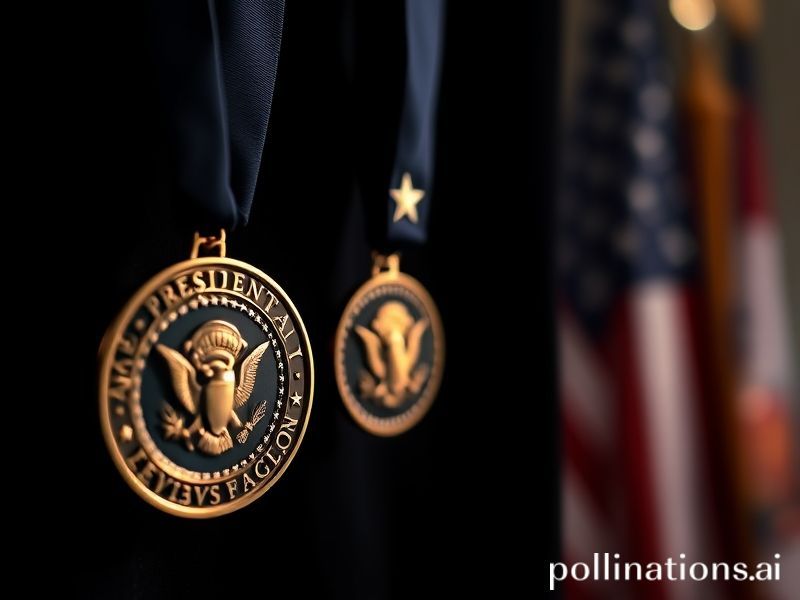Global Glitter: How America’s Medal of Freedom Became the World’s Most Coveted Participation Trophy
**The Global Currency of Freedom: When Nations Trade Gold for Glory**
In the grand bazaar of international diplomacy, where influence is bartered like spices in a Moroccan souk, the Medal of Freedom has become something of a luxury commodity—participation trophy for the geopolitically affluent. While Washington’s highest civilian honor was originally conceived as America’s way of saying “thanks for not being terrible,” it has evolved into a peculiar form of soft currency that nations eye with the same desperate longing a developing country reserves for IMF loans.
The recent spectacle—let’s call it what it is—of bestowing these gilded baubles reveals more about our global pecking order than any UN Security Council meeting ever could. When a tech billionaire receives the same medal once given to someone who actually, you know, saved lives, we’re not witnessing meritocracy in action. We’re watching the international community’s most elaborate LinkedIn endorsement system, complete with photo ops that scream “notice me, senpai” to the world’s remaining superpower.
From Beijing to Brussels, capitals parse these ceremonies like ancient priests divining sheep entrails. Who gets recognized—and more tellingly, who doesn’t—sends diplomatic tremors across continents. When a Ukrainian activist receives the medal while Yemeni human rights defenders remain unlauded, it’s not just oversight; it’s a masterclass in selective morality that would make even the most cynical realpolitik practitioner blush.
The medal’s transformation from genuine honor to geopolitical trading card reflects our broader slide into symbolic governance. Much like how carbon credits let corporations pretend they’re not destroying the planet, these medals allow nations to purchase moral credibility without the messy inconvenience of actual moral behavior. It’s the diplomatic equivalent of buying indulgences, except the priest wears a flag lapel pin and the confessional is televised.
European observers, still nursing their colonial hangover, watch these proceedings with the particular disdain of someone who’s seen this movie before. They recognize the pattern: first come the medals, then come the military bases. The French, who invented the concept of awarding civilians for not being completely useless (the Légion d’honneur, 1802), now view America’s medal inflation with the same horror a Michelin inspector reserves for McDonald’s attempting haute cuisine.
Meanwhile, developing nations have learned to game this system with the desperation of scholarship students at a Harvard mixer. They cultivate their diaspora communities, nurturing potential medal candidates like prize-winning orchids. “Congratulations on your successful heart surgery clinic in Lagos—have you considered moving to Palo Alto and donating to the right political campaigns?” It’s medical tourism in reverse: instead of patients traveling for care, we export recognition for conditions that improve with American proximity.
The medal’s international significance lies not in its recipients’ achievements but in its function as a global sorting hat. It separates the sanctioned from the sanctioned-against, the acceptable from the troublesome, those who’ll be invited to speak at Davos from those who’ll be speaking to empty chairs at The Hague. In a world where Twitter verification carries more weight than UN credentials, perhaps we shouldn’t be surprised that a necklace from America matters more than actual freedom.
As climate change renders borders increasingly theoretical and democracy becomes a boutique product available only in select zip codes, these medals serve as our civilization’s participation trophies—shiny distractions from the mounting evidence that we’re awarding ourselves for managing decline with style. The international community claps along because, honestly, what else is there to do while we wait for the next crisis?
In the end, the Medal of Freedom’s greatest achievement might be revealing how unfree we all are—trapped in a system where even recognition must be approved, stamped, and distributed according to strategic interests. But at least the medals are gold-plated, which should hold some value when everything else turns to ash.







